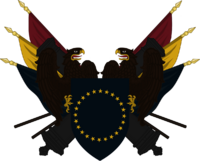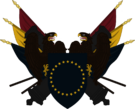National Assembly of Carloso: Difference between revisions
| Line 181: | Line 181: | ||
| style="background-color: #E3BC00; width: 21.65%"| 186 | | style="background-color: #E3BC00; width: 21.65%"| 186 | ||
| style="background-color: #57000E; width: 9.2%"| 79 | | style="background-color: #57000E; width: 9.2%"| 79 | ||
| style="background-color: #000000; width: | | style="background-color: #000000; width: 5.55%"| 46 | ||
| style="background-color: #000000; width: 9.7%"| Oth. | |||
|} | |} | ||
|- | |- | ||
Revision as of 12:56, 22 February 2020
This article is incomplete because it is pending further input from participants, or it is a work-in-progress by one author. Please comment on this article's talk page to share your input, comments and questions. Note: To contribute to this article, you may need to seek help from the author(s) of this page. |
National Assembly of Carloso Asamblea Nacional de Cárloso | |
|---|---|
| 43rd National Assembly of Carloso | |
 | |
| Type | |
| Type | |
| Houses | National Assembly |
| Structure | |
| Seats | 859 |
 | |
Political groups | Government (506)
|
| Elections | |
| Single transferable vote with elimination transfers only | |
Last election | 11 November 2015 |
Next election | 11 November 2020 |
| Meeting place | |
| House of the National Assembly, Madrigal, Carloso | |
 |
|---|
| This article is part of a series on the politics and government of the Federal Republic of Carloso |
Related topics
|
The National Assembly of Carloso (Spanish: Asamblea Nacional de Cárloso) is the unicameral legislature of Carloso. While its current form dates to the enactment of the new Constitution of Carloso in 1956, the National Assembly itself can be traced back to independence in 1581. Historically, the Carlosian Parliament was divided between the House of Commons and the House of Lords; later the National Assembly and Senate in the Republican period, however the 1956 constitution abolished the upper house and replaced them and with a unicameral National Assembly.
The last general election in Carloso was held in 2015. The next will be held in 2020.
Etymology
History
Imperial Carloso
Republic
Federal Republic
Elections
Constituencies
Single transferable vote
The system of the single transferable vote with elimination transfers only (STV-ETO) often penalises parties who field popular candidates in a constituency, as if their votes exceed the quota and they are elected, any surplus votes beyond that quota cannot be redistributed to other candidates running under that party. This resulted in the largely three-party system (Conservative, Democratic, Socialist Republican) that dominated Carlosian politics up until relatively recently. There is a fierce tradition in Carlosian politics of transfer pacts and complex political strategy in almost every constituency. If a party wishes to run two candidates in a constituency, posters and other election literature will direct voters to vote for a particular candidate depending on their geographic location. As such, the strength and discipline of the grassroots are vital to electoral success.
Carloso uses the Hare quota method.
Note: In many cases, each party will run more than one candidate in each constituency. This example presumes that only one candidate has been put forward.
Composition
| Party | Ideology | Position | Leader | Seats | |
|---|---|---|---|---|---|
| National Salvation | National conservatism | Right-wing | Cárlos Tobón | 507 / 859
| |
| Conservative Party | Liberal conservatism | Centre-right | Ferdinand Casares | 183 / 859
| |
| Democratic Party | Liberalism | Centre-left | Eric O'Neill | 68 / 859
| |
| Socialist Republicans | Democratic socialism | Left-wing | Maria Chambers | 30 / 859
| |
| Synarchist Union | Neo-fascism | Far-right | Damián Torrero | 24 / 859
| |
| Communist Party | Marxism-Leninism | Far-left | Thomas Bates | 18 / 859
| |
| Independent | N/A | N/A | N/A | 29 / 859
| |
|
| |||||||||||
| 1995–2000 |
| ||||||||||
| 2000–2005 |
| ||||||||||
| 2005–2010 |
| ||||||||||
| 2010–2015 |
| ||||||||||
| 2015–2020 |
| ||||||||||